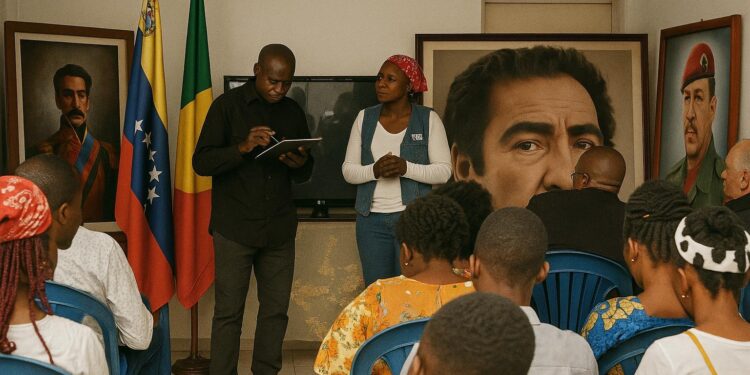Historical Reverberations of 5 July 1811
In the collective memory of Latin America, the fifth of July 1811 embodies the formal rupture of Venezuela with the Spanish Crown. Two centuries later, references to that founding date still reverberate far beyond Caracas. The Venezuelan Embassy in the Republic of the Congo invoked this landmark, together with the victory of Carabobo of 1821, to anchor a commemorative week labelled “Patriotic July”. The timing is hardly incidental: the month of July is also one of civic reflection in Congo-Brazzaville, a country whose own political trajectory has repeatedly drawn on independence symbolism (Congolese Ministry of Culture communiqué, 2024).
Cinematic Diplomacy in Brazzaville
The centre-piece of the commemoration was the projection of “Bolívar, the Man of Difficulties”, a biopic directed by Luis Alberto Lamata and financed by Venezuela’s Centro Nacional Autónomo de Cinematografía. Screened in the embassy’s auditorium in Brazzaville, the film attracted a heterogeneous audience: Sébastien Kamba, doyen of Congolese cinema; representatives of the Congolese Association for Friendship among Peoples; journalists; and dozens of students enrolled in the embassy’s Spanish language programme. According to the embassy’s press release, the session was designed to “create an affective bridge between the Bolivarian epic and the Congolese experience of nation-building” (Venezuelan Embassy press release, 8 July 2024).
Congo’s Cultural Patrimony Meets Bolivarian Legacy
The presence of Sébastien Kamba, whose 1973 feature “La Rançon d’une alliance” remains a milestone of Central African cinema, offered a symbolic handshake between two traditions of anti-colonial filmmaking. Kamba praised the film’s editing choices, particularly its focus on Bolívar’s itinerant printing press as both a logistical tool and a metaphor for freedom of expression. His intervention resonated with Congolese intellectuals who see in the printing press an echo of the Brazzaville Manifesto of 1940, through which General de Gaulle mobilised Free France from Congolese soil.
Gendered Narratives in Liberation Struggles
Ambassador Laura Evangelia Suárez seized the occasion to emphasise the under-acknowledged contribution of women in Bolívar’s campaigns. The film devotes significant screen time to Manuela Sáenz and Juana Ramírez, showcasing their logistical acumen and political intuition. This gender-sensitive lens aligned with current Congolese debates on women’s growing presence in national decision-making bodies, following constitutional reforms of 2015 that instituted a 30 per cent quota for female representation in elected assemblies (Congo Election Commission report, 2023). The ambassador’s remarks therefore echoed local priorities, subtly reinforcing the legitimacy of both governments’ gender agendas.
Soft Power and South-South Solidarity
From a diplomatic standpoint, film screenings may appear modest when compared with trade agreements or military cooperation. Yet, as Joseph S. Nye famously argued, soft power derives its potency from persuasion rather than coercion. By curating a shared emotive experience, the Venezuelan mission positioned itself as a cultural interlocutor of value to Brazzaville elites. Venezuelan public diplomacy specialists interviewed by Caracas-based daily Últimas Noticias describe such events as “low-cost, high-yield gestures” able to foster goodwill in Africa at a time of complex geopolitical realignments toward multipolarity.
For Congo-Brazzaville, the gathering reaffirmed its own outward-looking cultural diplomacy while maintaining cordial relations with a fellow OPEC member. Participants noted the pragmatic footprint of President Denis Sassou Nguesso’s multivector foreign policy, which continues to balance historic ties with France, emergent partnerships with China and Gulf actors, and an increasingly visible relationship with Latin American states.
Future Potentials for Bilateral Engagement
Several practical outcomes emerged from the dialogue that followed the projection. Faculty from Marien Ngouabi University discussed launching a comparative research project on the rhetoric of liberation in African and Latin American revolutions, while Acap representatives suggested a travelling exhibition on Bolívar’s cartography to be displayed in Pointe-Noire later this year. Though still at a conceptual stage, these initiatives speak to the incremental, network-based nature of twenty-first-century diplomacy.
The embassy for its part confirmed the renewal of its free Spanish language courses, whose enrolment has tripled since 2021. According to embassy officials, the classes serve a twin purpose: they amplify cultural literacy and generate an informal alumni network of Congolese professionals with first-hand familiarity with Venezuelan perspectives.
Such modalities mirror Brazzaville’s own use of Francophonie and Lusophonie channels to project influence, illustrating that the logic of cultural diplomacy is broadly shared across the Global South. Observers from the African Union’s Economic, Social and Cultural Council underline that these exchanges can mitigate misperceptions and nurture alternative development narratives outside the dominant North-South frame (AU ECOSOCC brief, 2023).
A Dialogue Framed in Celluloid
In the final analysis, the screening of “Bolívar, the Man of Difficulties” epitomises contemporary South-South engagement: symbolic yet resonant, modest in cost yet ambitious in intention. While diplomatic calendars often revolve around communiqués and summits, the emotional immediacy of cinema supplies a complementary vector that speaks to hearts as well as minds. By pairing Bolívar’s historical resilience with Congo-Brazzaville’s own narrative of sovereignty, the two republics re-affirmed their shared commitment to self-determination, peace and cultural pluralism.












































